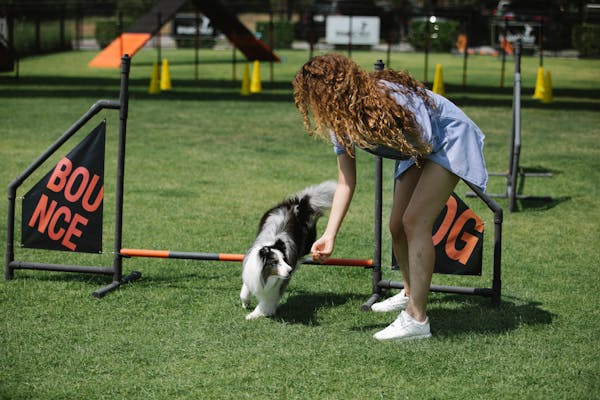The Importance of Regular Exercise for Pets: A Guide to Keeping Your Companion Healthy and Happy.
Regular exercise is not just a cornerstone of human health; it’s also crucial for our pets. From dogs and cats to rabbits and birds, physical activity plays a vital role in maintaining a pet’s physical well-being, mental acuity, and emotional balance. This comprehensive guide explores various exercise routines tailored to different types of pets, ensuring that your furry, feathered, or scaly friends lead a vibrant and healthy life.
Exercise for Dogs: More Than Just a Walk in the Park:
For dogs, exercise isn’t merely a luxury; it’s an essential part of daily life. Here are some effective ways to keep your canine companion active:
- Walking and Running: The simplest and most accessible form of exercise is a daily walk. However, energetic dogs may require more vigorous activities such as jogging or running. This not only helps burn off excess energy but also keeps their muscles toned and their mind engaged.
- Fetch and Frisbee: These games are excellent for improving your dog’s agility and endurance. They also strengthen the bond between you and your pet, providing fun and interactive ways to exercise.
- Agility Training: Setting up an obstacle course in your backyard or participating in an agility class can dramatically improve your dog’s agility and obedience. It’s also a fantastic way to stimulate their minds.
- Swimming: For dogs with joint issues or those that are overweight, swimming is a perfect exercise. It’s gentle on the joints but effective in maintaining an optimal weight and improving muscle mass.
- Hide and Seek: This playful activity enhances a dog’s problem-solving skills and can be a great indoor exercise option.
Keeping Cats Agile and Alert:
Cats might seem more independent, but they also need regular exercise to stay healthy. Here are some engaging activities for your feline friends:
- Interactive Toys: Toys that mimic the movement of prey, like laser pointers or feather wands, can captivate a cat’s attention and provide a good physical workout.
- Climbing Structures: Cats love to climb. Investing in a cat tree or installing shelves specifically for your cat can provide daily physical activity and save your furniture from their claws.
- Puzzle Feeders: These feeders are not only good for slowing down fast eaters but also excellent for mental stimulation, as they challenge cats to think and move.
- String and Wand Toys: Engaging your cat with a wand toy can mimic the thrill of the hunt, keeping them physically active and mentally sharp.
- Regular Playtime: Consistency is key. Regular play sessions help prevent obesity and behavioral problems in cats.
Exercise Options for Small Pets:
Small pets such as rabbits, guinea pigs, and hamsters also require exercise to prevent obesity and boredom. Here’s how you can help them stay active:
- Exercise Wheel/Ball: Ensure the wheel or ball is appropriate for your pet’s size. These tools are excellent for keeping small pets like hamsters active.
- Exploration Time: Allow rabbits and guinea pigs supervised time outside their cage in a secure area to explore. This not only provides physical exercise but also mental stimulation.
- Obstacle Courses: Use simple household items to create an engaging course for your pet. This is particularly great for rabbits, who are natural jumpers and enjoy challenges.
- Chew Toys: These help keep small pets engaged and also provide a good workout for their teeth, which can grow continuously.
Birds Need to Stretch Their Wings Too:
Birds are naturally active and require both physical and mental exercise. Here are ways to ensure your bird stays healthy:
- Free Flight: Allowing birds some free-flight time in a secure room gives them a chance to truly stretch their wings and engage in some healthy exercise.
- Varied Toys: Birds benefit from a variety of toys that challenge them physically and mentally, such as ladders, ropes, and bells.
- Diverse Perches: Installing perches of different textures and diameters encourages movement and helps keep their feet healthy.
- Training Sessions: Teaching your bird tricks or engaging in regular training sessions can provide mental stimulation and reinforce social bonds.
General Tips for Pet Exercise:
- Health First: Always consult with a veterinarian before starting any new exercise regimen, especially if your pet is older or has health issues.
- Consistency is Crucial: Regular, moderate exercise is more beneficial than intermittent intense sessions.
- Watch for Fatigue: Keep an eye on your pet’s tolerance levels. Stop the activity if they seem tired or disinterested.
Regular exercise is crucial for your pet’s health, happiness, and longevity. By incorporating appropriate physical activities into their daily routines, you can help prevent a host of health problems and enhance their quality of life. Whether it’s a dog that needs a run, a cat that thrives on play, or a bird that requires flight time, each pet has unique needs that must be met through tailored, engaging activities. Remember, an active pet is a healthy pet!
